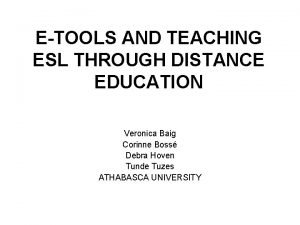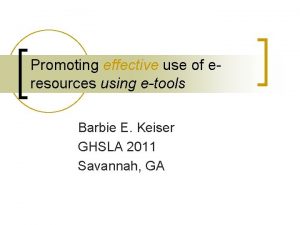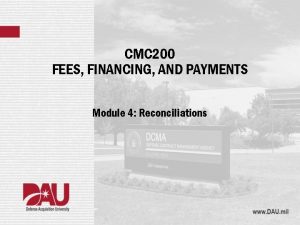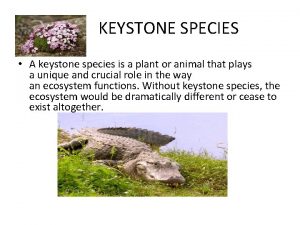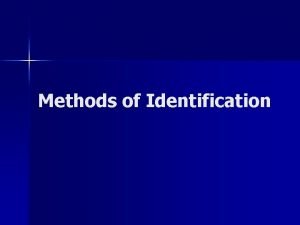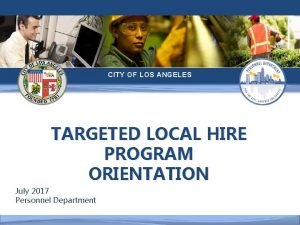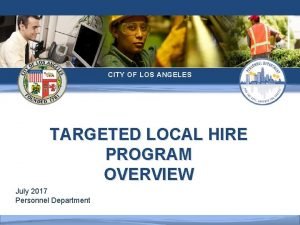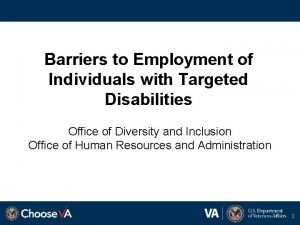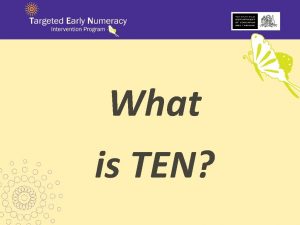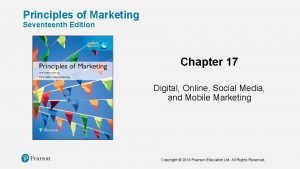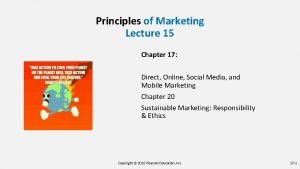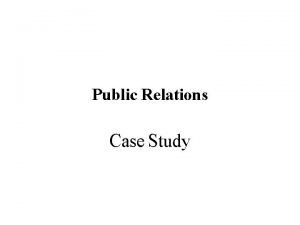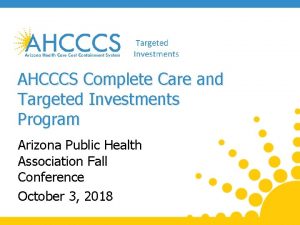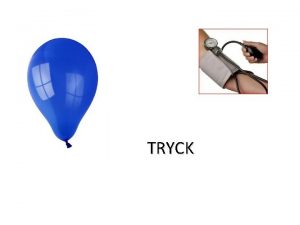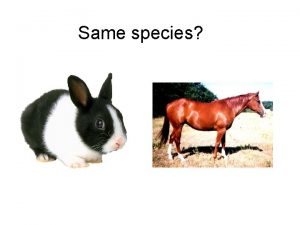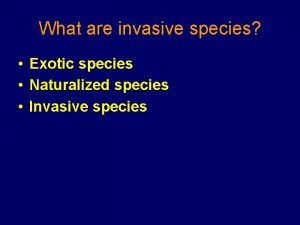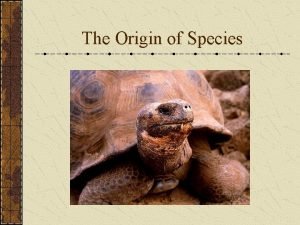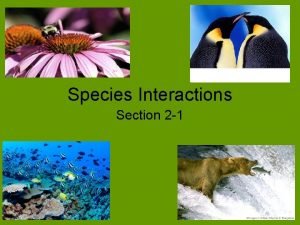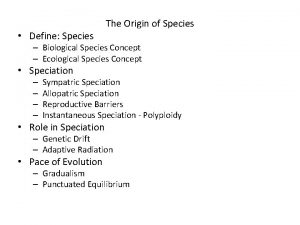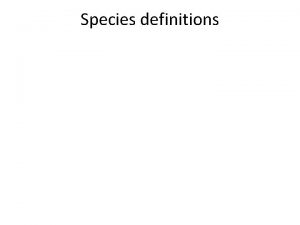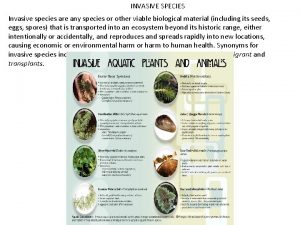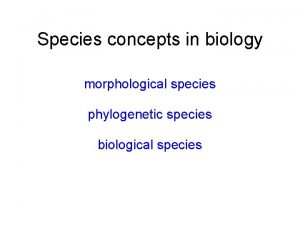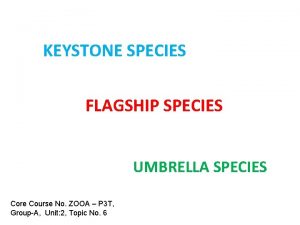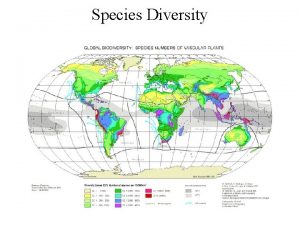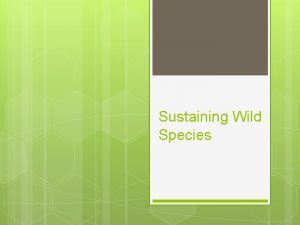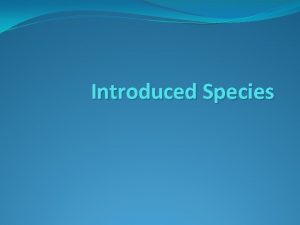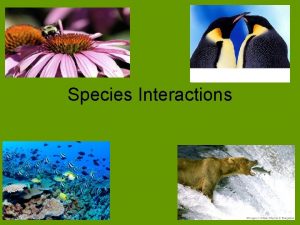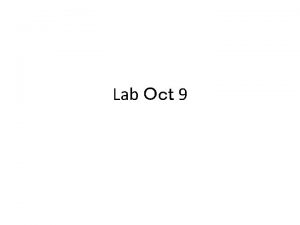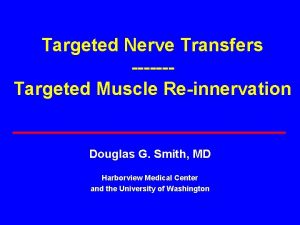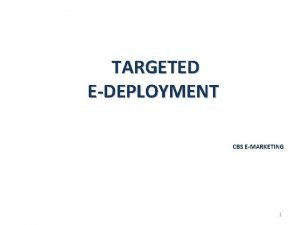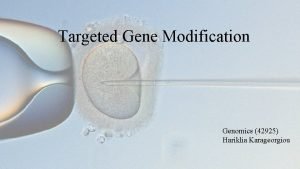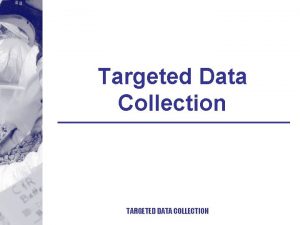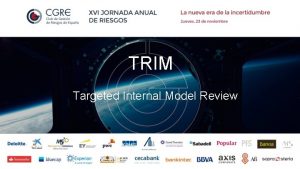Species Identification eTools for Education ecp2006 edu410019 Targeted






































- Slides: 38

Species Identification e-Tools for Education ecp-2006 -edu-410019 Targeted Project Starting date: 03. 09. 2007 This project is funded under the e. Contentplus programme , a multiannual Community programme to make digital content in Europe more accessible, usable and exploitable.

Identification of organisms: key to information ? ? The identification of organisms is fundamental to biology. The accurate identification provides a correct name through which detailed information can be unlocked. For example, taxonomic descriptions, ecological relations, economic values, conservation status, legislation status and genetic code. e. Contentplus |2

Goal Key. To. Nature (K 2 N) is focused on providing common access to data and interactive educational tools for the identification of organisms in order to enhance the knowledge of biodiversity at all educational levels. The long-term goal is to enhance the knowledge of biodiversity at all educational levels in an innovative way. Target audience: primary and secondary school students and teachers, university students and lectures. e. Contentplus |3

Aim of the e-learning solutions…. . is NOT: to learn and remember e. g. 10 of the 80 species around the school, BUT to train observation skills, train analytical skills by understanding how to decompose a complex organism into comparable units, understand the diversity of life on earth. e. Contentplus |4

Key. To. Nature (K 2 N) network Total budget 4. 8 Mil € EC Contribution 2. 4 Mil € EC Contribution rate 50% of total eligible costs Duration 36 months 14 Partners from 11 EU Countries of which: 7 data providers, 6 edu-technical partners, 1 project management SME 12 Work-packages (WPs) e. Contentplus |5

The Consortium Università degli Studi di Trieste – Dipartimento di Biologia - IT Data provider & Coordinator ETI Bioinformatics – NL Data provider, Interoperability, Databasing Biologische Bundesanstalt für Land und Forstwirtschaft - DE Data provider Real Jardìn Botànico - Consejo Superior de Investigaciones Cientìficas - ES Data provider University of Tartu – Institute of Ecology & Earth Sciences - EE Data provider Slovenian Museum of Natural History - SI Data provider Natural History Museum London – UK Data provider Friedrich Alexander Universität - FIM Neues Lernen – DE Pedagogy & Scientific elearning expertise Giunti Labs – IT Scientific e-learning expertise evolaris privatstiftung – AT ICT, IPR, & Business Model development Katholieke Universiteit Leuven - Centre For Usability Research - BE Usability Expertise Technical University of Cluj-Napoca – RO E-learning Technology Provider Bikam ltd – BG Educational Databasing and Digital Libraries expertise T & B e Associati Srl – IT Project Management, Business Model Development e. Contentplus |6

A user-centric approach is followed by Key. To. Nature. School involvement is at the centre of the project. The solutions will be targeted at local needs and contexts, i. e. e- and m-learning solutions to identify and learn about the organisms that can be found in the school garden, the local park, etc. These solutions will be appropriate for different levels of knowledge and formal learning as they will: not be tied to rigid systematics, will require different levels of observation of attributes to identify an organism, will cover a limited number of local species which can be modified according to the level of education: the smaller is the number of species, the easier to use is the identification tool. e. Contentplus |7

The New Approach (1) The “difficulty” of identification tools tends to increase with the number of organisms which they include ? ? Several “classical” keys include organisms occurring in widely different areas or ecological conditions. e. Contentplus |8

The new approach (2) The new approach permits to automatically produce identification tools restricted to small subsets of organisms !! e. g. “the plants of our school-garden” e. Contentplus |9

Needs analysis More than 200 teachers from primary school to university participated in focus groups and interviews conducted in all partner countries. This survey resulted in a pedagogical and educational needs analysis report. e. Contentplus | 10

Main objectives of K 2 N Increase access to, and simplify the use of e. Learning tools for identifying species Address educational content interoperability Optimise the effectiveness and the quality of educational content Add value to existing educational content by providing multilingual access Suggest best practices to address barriers to educational use, production, exposure, discovery and acquisition. e. Contentplus | 11

K 2 N and TDWG K 2 N adopted the TDWG standard for descriptive data (SDD) as one of the solutions to achieve its goals. A challenge in K 2 N will be to adapt SDD to ‘atomized’ identification data and to standardize species-ID data sets so they can be combined and re -used in packages adhering to the standard. SDD will be used at a large scale in K 2 N to exchange descriptive data in production quality tools. K 2 N mobilises a critical mass of content: Less than a year after K 2 N started 1, 320 identification keys in 11 languages are listed at http: //www. keytonature. eu. Many of these keys are custom made versions derived from a central K 2 N data set. e. Contentplus | 12

Secundary Data Apart from primary identification data (characters and states), K 2 N will also unlock a wealth of secondary data (illustrations, descriptions) available in Europe, using the same shared mechanisms. A survey of secondary data identified 241, 421 items, mainly still images (172, 426) and taxon pages (59, 004). e. Contentplus | 13

K 2 N technical infrastructure K 2 N portal Linnaeus II SDD Frida Teacher Media. Wiki import SDD e. Flora Primary and Secundary data Metadata Key repository Secundary data (multimedia) SCORM API E-learning environment e. Contentplus | 14

Experiments In 2008 / 2009 the K 2 N project will conduct several experiments with web-based and mobile identification services for educational applications. For example, the ‘Mobile Nature Guide’ for schools in The Netherlands provides access to identification data and user-defined keys covering more than 5, 000 plants, animals and fungi. Developed mechanisms will permit automatic production of identification tools for different media: The Internet, mobile and desktop applications. e. Contentplus | 15

Developed software Software to identify species or other taxa will be made available under the name IBIS - Interactive Biodiversity Identification Software. Intended users range from school children or citizen scientists to ecologists or taxonomists. The identification keys can be embedded in Content Management Systems or Wikis. Software will be made available as open source software at: http: //sourceforge. net/projects/ibis-id/ Some examples: Multi-access key (Technical University of Cluj-Napoca ) Mobile key (ETI): http: //ip 52. eti. uva. nl/soortenbank/mobiel. php Flex viewer with combined key (ETI): http: //145. 18. 162. 102/flex/SDD_05/bindebug/SDD_05. html e. Contentplus | 16

Thank you for your attention! e. Contentplus | 17

The Traditional Approach …. Ovary inferior Order Ovary superior Carpels 4, free Family Carpels 5, fused Stamens hairy Genus Stamens glabrous Fruit dehiscent Species Fruit non dehiscent The traditional approach, developed prior to the computer era, is mainly based on classification. It first requires the identification of Order, Family, and Genus. The characters distinguishing Orders, Families and Genera are usually difficult, hence these identification tools are also difficult. e. Contentplus | 18

The Baseline – Books are written by experts for experts. They constitute useful reference, but lack the flexibility of PC-based tools (hypertext, multimedia, searching etc. ) And above all … Classification is not Identification! e. Contentplus | 19

The New Approach Flower red, leaves divided Order Family Flower white, leaves entire Genus Species In the new approach, the characters distinguishing the organisms are organised into a database, and the identification tools can select those characters which render the identification easier, including those which are not relevant for biological classification. e. Contentplus | 20

The New Approach Key. To. Nature identification tools work on several media. The new guides are easily adapted and available on different media, which can be used in different contexts: a) Internet, b) DVD and CD-ROMS, c) PDAs, d) hard copies etc. e. Contentplus | 21

The Workplan WP 1 Project coordination and management WP 2 Analysis of users' needs and demand WP 3 Inventory of existing educational products WP 4 Addressing access, searchability, use and re-use of secondary data and items WP 5 Addressing, analysis and testing exchange and interoperability of identification data WP 6 Interfaces, usability and mobility WP 7 Pedagogy and didactics WP 8 User experience WP 9 Educational contents reengineering WP 10 IPR issues WP 11 Dissemination & exploitation of the e-contents and e. Learning products WP 12 Monitoring Evaluation and assessment e. Contentplus | 22

The Baseline – Available tools and associated problems Many PC-based tools exist for identification purposes, e. g. CISRO DELTA, Diversity. Descriptions, FRIDA, Linnaeus II, Lucid 2 & 3, XPer 2, . . Problems associated with these tools can be clustered into 4 categories: Exchange of secondary data (sounds, images, . . ) Exchange of primary data (embedded in the tools for generating keys) IPR issues Suitability to support learning at various levels ? ? e. Contentplus | 23

Many PC-based tools exist for identification purposes, e. g. CISRO DELTA, Diversity. Descriptions, FRIDA, Linnaeus II, Lucid 2 & 3, XPer 2 AT THE MOMENT THEY ARE ISOLATED AND CANNOT EXCHANGE DATA e. Contentplus | 24

! Exchange of secondary data is not a difficult problem as all tools use standard formats like jpg, gif, etc. ! DATA EXCHANGE SECONDARY DATA (images, sounds, names, maps etc. ) ! ! e. Contentplus | 25

Exchange of primary data is much more difficult due to the different data formats used by different identification software. ? ? ? DATA EXCHANGE PRIMARY DATA (those embedded in the programs generating the keys) ? ? ? e. Contentplus | 26

IPR issues constitute one of the major constraints to data exchange, use and re-use. In particular the novel and advanced nature of the educational products aggregated within the project raises some fundamental questions which until now were rarely considered in the field of IPR. There are 2 principal aspects: IPR problems related to secondary data must be carefully examined, but basically they do not constitute a novelty. Primary data embedded in the software which produce the interactive keys can potentially generate a series of IPR problems whose solution still needs clarification. The main question is: The software in use permits extraction from the general Key of an infinite number of apparently fully original keys, by selecting subsets of species or changing the hierarchy of characters. In such cases who is the real author of the new products? The person who in a relatively short time has selected the species and changed the order of characters or the numerous specialists which have provided the data? ? e. Contentplus | 27

Available tools are often made for experts and do not support learning at various levels. Interfaces are too complicated and use a technical language which is not appropriate for non-experts (school-children). The tools support identification of species only, they are not embedded in a didactic concept. No interfaces to learning management systems exist. … e. Contentplus | 28

Key. To. Nature mobilises a critical mass of content (1) 790 Identification keys (mostly derived from a central dataset) Group of Organisms: % of Identification tools e. Contentplus | 29

Key. To. Nature mobilises a critical mass of content (2) About 50. 000 taxa e. Contentplus | 30

Best practices of existing solutions will be integrated. e. Contentplus | 31

A special focus is laid on interface usability. Easy to use keys, well illustrated and described by multimedia documents, enable even non-experts to easily identify species. e. Contentplus | 32

The e-learning solutions will support different pedagogical models and aim at optimal user experienc Pedagogical Model 1 Pedagogical Model 2 … Pedagogical Model n e-Learning Solution User Experience LIKEABILITY SOCIABILITY PLAYABILITY USABILITY FUNCTIONALITY ACCESSIBILITY e. Contentplus | 33

By sending an expert to the schools individual solutions can be delivered. School 3 - The expert gets in touch with teachers and discusses their project 4 - The expert sends a list of species to Key. To. Nature (e. g. ”the plants of the pond”) e. Contentplus | 34

A fast first proposal is delivered within days rather than weeks. 5 - Within 2 days, Key. To. Nature sends to expert and teachers: a) a first Internet version of the guide, b) a first textual version. e. Contentplus | 35

The generated keys are tested by end-users and experts. School 6 - Expert + teachers test the keys and send their proposals (e. g. changes of terminology, etc. ) back to Key. To. Nature. e. Contentplus | 36

Key. To. Nature deliverables are identification tools for several media. OK 7 - Within a week expert + teachers (co-authors!) receive the final: 1) Internet version 2) CD-Rom version 3) Version for PDAs 4) Textual version e. Contentplus | 37

Linking with the globe … Species 2000 Lifewatch GBIF Encyclopedia of Life Marbef OPAL EDIT Fishbase Identify Life Visit: www. keytonature. eu e. Contentplus | 38
 Etools for education
Etools for education Viewletbuilder competitors
Viewletbuilder competitors Dcma etools
Dcma etools Mountain lion keystone species
Mountain lion keystone species Positive identification
Positive identification Targeted youth support islington
Targeted youth support islington Ncach
Ncach Targeted solutions tool hand hygiene
Targeted solutions tool hand hygiene Targeted local hire
Targeted local hire Targeted local hire program
Targeted local hire program Targeted disabilities
Targeted disabilities Targeted local hire program agency referral form
Targeted local hire program agency referral form Ltv96
Ltv96 Targeted early numeracy (ten) intervention program
Targeted early numeracy (ten) intervention program Marketing involve engaging directly with carefully targeted
Marketing involve engaging directly with carefully targeted Marketing involve engaging directly with carefully targeted
Marketing involve engaging directly with carefully targeted Recruitment sources
Recruitment sources Targeted delivery
Targeted delivery Onvansertib
Onvansertib Public candy companies
Public candy companies Consist of your most important targeted or segmented groups
Consist of your most important targeted or segmented groups Ahcccs complete care plan
Ahcccs complete care plan Fspos
Fspos Typiska drag för en novell
Typiska drag för en novell Tack för att ni lyssnade bild
Tack för att ni lyssnade bild Vad står k.r.å.k.a.n för
Vad står k.r.å.k.a.n för Varför kallas perioden 1918-1939 för mellankrigstiden?
Varför kallas perioden 1918-1939 för mellankrigstiden? En lathund för arbete med kontinuitetshantering
En lathund för arbete med kontinuitetshantering Personalliggare bygg undantag
Personalliggare bygg undantag Tidbok
Tidbok Sura för anatom
Sura för anatom Densitet vatten
Densitet vatten Datorkunskap för nybörjare
Datorkunskap för nybörjare Stig kerman
Stig kerman Debatt artikel mall
Debatt artikel mall Delegerande ledarskap
Delegerande ledarskap Nyckelkompetenser för livslångt lärande
Nyckelkompetenser för livslångt lärande Påbyggnader för flakfordon
Påbyggnader för flakfordon Formel för lufttryck
Formel för lufttryck
